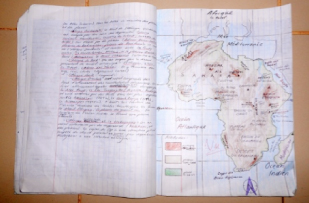StoriesBack to Stories
YES Abroad Student Explores a Malian Classroom

Today marked the end of my first week of school. I am already surprised by how much my French has improved in just one week of school. Although understanding my classes (which was my biggest concern before starting), has been difficult and sometimes frustrating, I realized that because French and English have so many cognates, if I just think about what I already know about a subject, I can pick out many words that sound similar to English and thus piece together the main idea of the lesson.
For example, in my Geography class this week my professor gave a lecture about the geological history of Africa. He said, “Pendant cette period, L’afrique etait couverte d’une grand chaine de montagnes. Ces montagnes ont etait raboten par l’erosion…” I may have spelled some of these words incorrectly during my note taking, but as an English speaker, it isn’t too hard to get a general idea of what this sentence means based solely on the cognates (words that are spelled the same or very similarly). When I heard this for the first time, my thinking process was:
Okay, so he’s talking about Africa, “couvert” sounds like covered, “chaine de montagne” that sounds like chain of mountains, “erosion” is the same as in English… so he is saying that Africa was covered by a large chain of mountains and at some point they began to erode? etc..
I apply this same thinking process to all my classes and it has worked pretty well, so I’m finding that I am not having too much difficulty understanding.
The hard part about Malian “lycee” is the way the classes are structured. It is very unlike my rather progressive high school in the US, where we sit in a circle and the students do 50% or more of the talking, and we are constantly asked to teach eachother and contribute our own ideas, and we treat many of our teachers casually and on occasion even meet outside of class time just for the “fun of learning”. In contrast, the Malian school system is much more traditional. Respect is very important. When the teacher enters the class (students stay in the same class all day and the teacher rotates) all of the students must stand up until he takes his place at his desk. Then, instead of the seminar style classes I am used to having at my high school, the Malian classes are solely lecture based. The teacher stands up in front of the class and reads the lesson directly from his notes, which we are to copy down word for word in our notebooks to go home and memorize. Luckily, I have not had any tests yet, but I hear that on the tests we are asked to write back exactly what he has said in the lecture, word for word. It is has been pretty difficult for me to write down everything the teacher says because all the sounds mash together and nothing is pronounced how it is spelled, but luckily the girl I sit next to lets me copy all of her notes. So, overall I am not having too difficult of a time. I just have to remain alert and really concentrate on what my teacher is saying.
Some Notes on the Malian School System
In high school (lycee), students must decide on a “track” or a cluster of specialized courses. For example, one can pick Science Exacte or Science Biolgie which are both focused on science and math. I picked Science Humaine which is focused on the humanities (specifically history, geography, literature and language. I also take science and math courses as well, but they are less important). I like this track system so far because you get to pick a general area of interest that you want to focus on and then you only have to take a little bit of everything else. However, there is no picking and choosing of the individual classes you want to take, so once you pick your track you may only take the classes that the school has assigned to that track.
My class schedule changes every day of the week, but generally the school day starts at 7:30 AM and then I have two or three classes (each one or two hours long) until 10:30AM. At 10:30 we have a breakfast/lunch break where we can hang out in the courtyard or classrooms and buy sandwiches and drinks. Class begins again from 11:00AM until 1:00PM. At 1:00 we go home for a larger lunch (as always, lots of eating). I love this system because I get to eat two full lunches. We go back to school from 2:30 to 4:30 or 5:30 depending on the day, and on Fridays I don’t have to return to school after 1:00.
Despite the few difficulties, school here has been great. It has been really easy to make friends because everyone is so friendly and outgoing here. The kids in my class love to teach me phrases in Bambara (like “kan djeun me be”, a slang term similar to “whats up”) and it’s pretty fun when they practice their English with me as well.
-Meena Oberdick, YES Abroad Mali Scholar, Grade 12





